- Home
- Charles L. Grant
The Hour of the Oxrun Dead (Necon Classic Horror) Page 4
The Hour of the Oxrun Dead (Necon Classic Horror) Read online
Page 4
Suddenly she yanked her purse from the counter and rummaged until she located an oval compact. Flipping its mirror up, she stared at the image in the dim white light. Thirty looking twenty, the schoolgirl profile so many matrons coveted. A nose too stubbed, ears too protruding to be truly attractive. At times she wished she were a man so she could grow a beard to hide the tiny chin lost beneath full dark lips and high cheeks. At times.
“And who will you be, my pretty little maid,” she whispered, “who will you be at fifty?”
Ben was dead. Vorhees was dead. The same murderer, or someone who had read of the former and decided to imitate?
In the beginning, there had been an uncharacteristic lust for revenge. A life cut short-not Ben’s, but hers. The drive faded, however, dulled, because an intellectual game, which had forced her to wonder about the state of her emotions, had nearly stampeded her onto the couch of the doctor Sam and Elaine were urging upon her. But the game, too, had lost its appeal, and until this morning, Ben’s killer had gone the way of old Judge Crater.
It wasn’t bravery, then, that had kept her in Oxrun, nor that brief tenure of vengeance.
With no family, few friends, there was no place else to go.
And the only reason she’d retained her married name was a need for an anchor outside her books.
“Enough,” she said loudly, jumping at the faint echoes hovering in the high ceiling. She shook her shoulders and pulled the computer list to her. After a second’s organization, she began to record the titles she’d marked. There was no carbon; she’d read once that carbons could be deciphered with the proper equipment, and unless she had actually discovered the makings of a conspiracy, she wanted no one to know of her clandestine scheme.
In the middle of the second page, the telephone rang.
“Hey, lady, are you still working?”
Still lost in the traces of what she was doing, Natalie didn’t recognize the voice immediately; then, with a wrench, she shoved back from the typewriter.
“Marc, are you still working?”
“No fair answering a question with a question. Do you have any idea what time it is?”
She checked her watch and stifled a gasp when she saw the time was well past eight. “I had a lot to do,” she said meekly.
“Yeah, right. Well, look, it’s bloody cold out here. Do you mind if I come in and keep you company until you’re done?”
Out here? She looked up and saw a faint shadow within the phone booth at the juncture of sidewalk and library lawn. She laughed, then, waved and hung up. A perfunctory check of her hair guided her to the door which she unlocked only when Marc came close enough to identify.
“You know,” he said, hugging himself as he wandered back toward the counter, “I never did see what anyone would want with a mausoleum like this.” He stared up at the darkness above the light, glanced at the shadows of books and magazines on the racks to the right of the desk. “I mean, libraries are no fun anymore. No dust, no snoring old men at the newspaper table, things like that.” When he reached the counter, he picked up a portion of the printout and waved it. “See what I mean? Computers and everything. Whatever happened to that rotten old lady who wouldn’t let me read anything in the adult section because it would warp my impressionable little mind?”
“You’re looking at her,” Natalie said mock sternly. “Only, I don’t particularly think of myself as rotten.”
“Just an expression,” he said, and for the first time read the paper he was holding. “What’s this? A list of books to burn?”
Gently she took the sheet from his hand. “No, just taking inventory. Books get lost, you know. Happens all the time.”
“Stolen, you mean.”
She turned away and walked into the center of the horseshoe, hoping her movements seemed casual as she dropped the typewriter’s plastic cover into place. “Yes, stolen, too. There are always people too cheap to buy books, and too lazy to bring them back.”
“Ah, the scofflaw syndrome. I know it well.”
“Don’t tell me, sir, that the fine citizens of this community steal your newspaper?”
“Who? Us? Never. They don’t dare, or we’ll raise the price to a quarter instead of the long-dead dime. No, I mean the out-of-towners, such as they are, who use the parking meters and never pay up. Things like that.”
This is ridiculous, Natalie thought, the dumbest conversation I’ve ever had. There was an impulse, then, to confide in Marc about her possible discovery, but it died unvoiced as he reached over the counter and snatched her coat from the back of the chair.
“Listen, lady,” he said, “I have to be at a certain house tonight to cover a certain very important social event of the time. I had hoped to catch you earlier in order to ask — no, pray — that you come with me and keep me from dying of boredom.”
“Then why go if you’re going to be bored?” She joined him by the magazine rack and slipped into the coat before she knew what she was doing. “Why not just go home?”
“Because,” Marc intoned, “Dederson commands. It’s his way of getting back at me for the lousy articles he thinks I’m writing.”
With a moue of sympathy and a pat on his shoulder, she gathered her papers together quickly and replaced them in the drawer, locked it and dropped the keys into her purse.
“It sounds to me,” she said as she pushed him toward the door, “like I’m rather an afterthought in all this.”
“Oh, now wait a minute, Nat —
“Hey,” she said, using the master switch to turn off all the lights before pushing him outside, “calm down. I was only kidding.”
He faced her, then, and cupped a hand to her elbow. “Nat, believe me, if nothing else in this world, you are definitely not an afterthought. Not with me. Not with anybody, for that matter. I didn’t ask you before because I wasn’t sure how you were going to take Vorhees’ death, that’s all.”
Odd, she thought as they walked slowly to the sidewalk, but if that had been Sam talking, I would have been offended.
“What do you say?” he asked quietly.
The living room. The television. Hot cocoa and the wind blowing in from ...
‘‘I’ll consider it very carefully.”
They walked, and she was pleasantly conscious that he’d not released her arm, had in fact taken her hand by the time they’d reached her porch. It was a movement so natural there was no objection, and he said nothing until he peered through the darkness across her side yard. “How,” he asked, “do you live with that thing out there?”
At the end of the street was a low cyclone fence topped with a double strand of barbed wire. During the growing seasons it was camouflaged by untended shrubbery and several massive willows; during fall and winter it was slightly imposing-less for its size than the clearly visible expanse of carefully mown grassland that stretched for over a hundred yards toward the newest section of the Oxrun Memorial Park. Sans moonlight, the tombstones and scatterings of ornate mausoleums were invisible, and with the sun the closest seemed only to be nothing more than sculptured boulders.
But Natalie knew what he meant. Simply the thought of settling near the neighboring dead had kept most of the homes bordering the cemetery empty for months at a time On her own street, hers was the only house occupied.
The graveyard’s proximity had never bothered her, however. The visitors and mourners generally confined their activities to weekends and holidays, a time when she made it a silent point to keep the side windows curtained. The one or two stragglers who wandered over the grassy area were usually lovers looking for a place to test their courage.
She herself had gone to Ben’s grave only twice; once for the funeral, and once a month later when she stood staring down at the words too neatly engraved in marble, waiting for a prayer, feeling only that she hadn’t known her husband long enough to miss him more than she would a close friend.
“Actually,” she said as she fumbled with the lock, “I kind of like it, you know? Shall
I run through the gags about the peace and quiet and the neighbors and all that?”
“Not if you’re going to be a deadly bore about it.”
She groaned dutifully, pushed him into the living room and switched on all the Tiffany style lamps. He flopped immediately onto the sofa and pulled open his coat. He was already dressed in dark suit and waistcoat, and a fleeting annoyance stiffened her until she remembered he would be attending the affair whether she accompanied him or not.
“You ever look at the older ones? The stones, I mean, from the Civil War, and like that?”
She nodded as she hooked her coat on the hall rack and took a quick look in its center mirror. “Once in a while, when I get to feeling too pompously immortal.” She stood in the doorway, her hands clasped at her waist until, seeing herself posing, shifting them behind her. “Could you use a little coffee, Marc?”
“Nat, will you relax, for God’s sake? I’m not going to rape you, you know,” He sat up and rested his palms on his knees. “Come on, Nat, go with me. It might not be as dull as you think.”
‘‘I’ll get your coffee,” she said, and walked stiffly past the stairs, habit stopping her long enough to test the cellar door and again, the knob to the den. Satisfied, and feeling oddly foolish, she crossed back to the kitchen and, with one hand on the stove, stared at her reflection in the dark window glass. They were fencing, maneuvering like characters in a play speaking lines that had too much meaning if they should only stop to listen. She settled a finger lightly against her breast, then pressed to see if she could feel her heart pounding. Nothing, and she laughed at herself, stroked at her hair for comfort and turned the burner on under the kettle.
“Hey, Nat!”
His voice startled her, not because she didn’t recognize it, but because it was something the house wasn’t used to. She stepped into the corridor and saw him standing by the den.
“What’s in here, Nat? Or am I being too nosy?”
She was about to identify the room brusquely when something pushed her to his side. “It’s a den. Library. I don’t know what you would call it.” She reached up over the door, felt along the lintel and pulled down a tarnished bronze key. She watched her hands as they guided the key into the lock: They weren’t trembling, nor did they falter. And relief was like a spring breeze sweeping through a dusty room.
“Hey, Nat,” he said while she fumbled for the light switch. “Hey, I didn’t mean I wanted to poke my nose in here. I was just curious.”
She looked at him and thought: So am I.
It was no bigger than the bedroom upstairs, furnished simply with a pseudo leather love seat, a walnut ash tray on a chrome stand perched next to a thickly upholstered arm chair. One bookcase built in to the right hand wall was empty. Under the window that looked out onto the yard was a secondhand secretary, and on it a shoe box bound with yellowed cord.
“I haven’t been in here in months,” she said, trying not to sneeze in the musty air. “When I clean, I plan to do a once over lightly.” She shrugged. “Somehow I never get around to it.”
“Ben’s?” He was subdued, but there was an edge to his question that made her frown.
“Yes,” she said, running a thumb over the box. “Before he’d go on duty, he would come in here to relax. Read a little law, or a mystery, or some notes on the two or three big cases he’d have once a year.”
“You weren’t allowed?”
She thought while she opened the box and dipped her fingers inside. “It wasn’t so much that I wasn’t allowed. I just didn’t feel right, I guess.” She grinned and held up a gold ring. “His one big gift to himself. He said he’d seen it in a film and had ordered one made like it, hoping it would add something to his image.” She laughed, shook her head, and dropped the ring back.
“Well, let me tell you something, lady. I’d never-” Marc stopped and stepped = back into the corridor. “Hey, your kettle’s screaming.”
Natalie tried to hurry the cord back into place, failed and left it. When she closed the door behind her, Marc handed her the key and stared at it so obviously that she had to smile as she put it back on the ledge again without using it. Then she brushed past him and worried at the stove until the coffee had been poured.
“Say,” he said quietly as he took a chair at the table. “l just had this feeling that I’m imposing. I mean, here I am trying to sweep you out of the house, and all I’m really doing is prowling and making you play hostess and . . .” He sputtered and looked so discomfited that she wanted to lay a maternally soothing hand on his head.
“Don’t worry about it.” She placed cup and saucer in front of him and smiled. “If I’m acting a little strange, it’s because I’m not used to . . . well, it’s been a while, you know, since I’ve had visitors . . . like you.”
He relaxed, then, and blew gently at the steam rising into his face. “Natalie, sometimes I worry about you. Really I do. This isn’t exactly the most compromising position in the world, you know.”
“Cut it right there!” she snapped. “We’ll have none of that! None.”
He seemed surprised at her vehemence, and somewhat stricken. But she couldn’t resist the stirrings of faint panic, couldn’t stifle the notion that unless she stayed on her guard, Marc would walk boldly in where she hadn’t allowed a man for too long a time. Despite the scoffing that instantly replaced the fear, she kept telling herself it was too soon, that she needed more time.
And that, she knew, was just as much a deception as the idea that Oxrun Station was a perfectly normal town.
“I’ll go,” she said finally, pricking the weighted balloon that had been pressing on her lungs. “But only on one condition.”
“Name it.”
“That if he’s there, you have to keep me away from Wayne Gernard.”
Marc blinked in surprise. “You mean the college professor? He of the fat hands and portly cummerbund? That Wayne Gernard? You mean that oily slime pit has his sights set on you?”
“You know something,” she said, leaning forward on her palms in front of him. “I’m not surprised you never got married, Marcus Clayton. Your knowledge and respect of and for the sensitivity of a woman’s vanity is quite a bit less than zero.”
He bowed mockingly and pointed at her clothes with his cup. “May I suggest, however, that the sensitivity of the crowd we are about to suffer would be less challenged if you were to change into something less, shall we say, provocative?”
Instinctively, she looked down at the filmy blouse and ran her hands sensuously over her hips. “If I went topless, do you think anyone would notice?”
“Do you want another sample of my sensitivity, or a truthful answer?”
“Drop dead, Clayton, and drink your foul coffee. The dishwasher’s over there. Clean up when you’re done. I’ll be down in a minute.”
* * *
Chapter 3
“They should be marble,” Marc said. He stood in the center of the small foyer and pointed to the stairs as she descended. Then he held out his hand and waited, patiently.
Her gown was a brown-and-gold caftan girdled at the waist by a wide white band. A matching tassel dangled from her right hip, and a cowl trimmed in crimson was folded against her back. It was an impulse, choosing this outfit, and she only knew that it tended in some unfathomable way to guide men’s appreciative glances first to her feet sandaled in brown, then swiftly to her eyes that were a green so deep they were often mistaken for black. The looseness of the woolen cloth pleased her for the illusion of buxomness it created, and the flow it lent to her short-paced walk. It wasn’t what she would have ordinarily worn on such an occasion, but Marc’s cynicism had rubbed off, and it felt delightfully fresh. The Widow, she had decided in front of the bathroom mirror, would strike again.
Without a word he draped her coat over her shoulders, buttoned his own to the throat and escorted her outside. Darkness, save for the single dim street light, was nearly absolute; a rustling of the willows signaled a breeze in fro
m the cemetery.
“We could walk to my place to get my car,” he said, obviously not relishing the idea, and she dipped into her evening purse and pulled out a single silvered key.
“The garage, Marcus. My carriage.”
He jumped the four steps to the walk and ran across the lawn to the garage. A moment later his curses made her laugh. The hinges of the double doors were rusted stiff and did not give easily to those in a hurry. Then she shook her head as he backed the grumbling Oldsmobile into the street and slid out to lean disgustedly against the roof.
“Tell me, librarian, how old is this thing?”
“Not quite as old as I am,” she said, flashing him a smile before taking a seat.
“I wouldn’t bet on it. It must have more holes on the bottom than the Swiss have cheese.”
“Not very original,” she commented wryly.
“Crap. The thing’s falling apart.”
“You would rather walk?”
He groaned, switched on the headlights and pulled away from the curb.
Onto the Pike and left, they remained silent as they passed the dark library and followed the park’s northern boundary. The iron fence was nearly invisible under trees that dipped wearily down to the sidewalk, gleaming only when a street lamp shattered its light through the leaves that remained. There were no pedestrians. And it was an uncomfortable effort to keep from staring through the darkness and imagining the scene of the assistant dean’s murder. Then she heard it again: Ben’s final puzzling transmission, the scream, and the sound of a heavy weight falling before the radio crackled with orders from Control to the other patrols.
It shouldn’t be happening again, she thought nervously. Nothing like that should happen twice in anyone’s life.
‘‘I’m not a rich man, but I’ll give you a penny, Nat.”

![[Oxrun Station] The Orchard Read online](http://i1.bookreadfree.com/i/03/17/oxrun_station_the_orchard_preview.jpg) [Oxrun Station] The Orchard
[Oxrun Station] The Orchard![Riders in the Sky - [Millennium Quartet 04] Read online](http://i1.bookreadfree.com/i/03/20/riders_in_the_sky_-_millennium_quartet_04_preview.jpg) Riders in the Sky - [Millennium Quartet 04]
Riders in the Sky - [Millennium Quartet 04]![Chariot - [Millennium Quartet 03] Read online](http://i1.bookreadfree.com/i/03/19/chariot_-_millennium_quartet_03_preview.jpg) Chariot - [Millennium Quartet 03]
Chariot - [Millennium Quartet 03]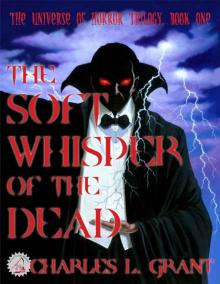 The Universe of Horror Volume 1: The Soft Whisper of the Dead (Neccon Classic Horror)
The Universe of Horror Volume 1: The Soft Whisper of the Dead (Neccon Classic Horror)![[Oxrun Station] Dialing The Wind Read online](http://i1.bookreadfree.com/i/03/19/oxrun_station_dialing_the_wind_preview.jpg) [Oxrun Station] Dialing The Wind
[Oxrun Station] Dialing The Wind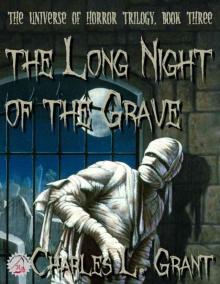 The Universe of Horror Volume 3: The Long Night of the Grave (Neccon Classic Horror)
The Universe of Horror Volume 3: The Long Night of the Grave (Neccon Classic Horror) The Grave - An Oxrun Station Novel (Oxrun Station Novels)
The Grave - An Oxrun Station Novel (Oxrun Station Novels)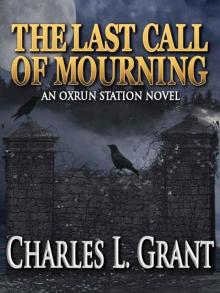 The Last Call of Mourning - An Oxrun Station Novel (Oxrun Station Novels)
The Last Call of Mourning - An Oxrun Station Novel (Oxrun Station Novels) The Complete Short Fiction of Charles L. Grant, Volume IV: The Black Carousel
The Complete Short Fiction of Charles L. Grant, Volume IV: The Black Carousel The Bloodwind - An Oxrun Station Novel (Oxrun Station Novels)
The Bloodwind - An Oxrun Station Novel (Oxrun Station Novels)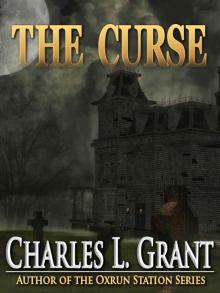 The Curse
The Curse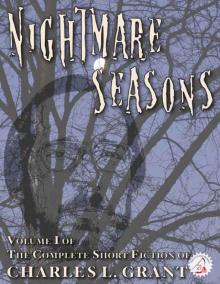 The Complete Short Fiction of Charles L. Grant Volume 1: Nightmare Seasons (Necon Classic Horror)
The Complete Short Fiction of Charles L. Grant Volume 1: Nightmare Seasons (Necon Classic Horror)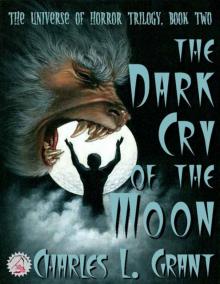 The Universe of Horror Volume 2: The Dark Cry of the Moon (Neccon Classic Horror)
The Universe of Horror Volume 2: The Dark Cry of the Moon (Neccon Classic Horror) Watcher: Based on the Apocalypse (World of Darkness : Werewolf)
Watcher: Based on the Apocalypse (World of Darkness : Werewolf)![[Oxrun Station] The Bloodwind Read online](http://i1.bookreadfree.com/i/03/25/oxrun_station_the_bloodwind_preview.jpg) [Oxrun Station] The Bloodwind
[Oxrun Station] The Bloodwind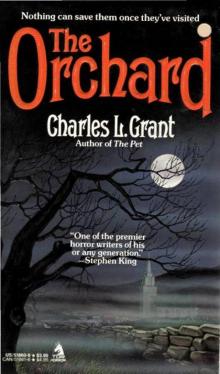 The Orchard
The Orchard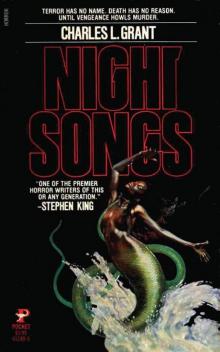 Night Songs
Night Songs Shadows 3
Shadows 3![Symphony - [Millennium Quartet 01] Read online](http://i1.bookreadfree.com/i1/04/02/symphony_-_millennium_quartet_01_preview.jpg) Symphony - [Millennium Quartet 01]
Symphony - [Millennium Quartet 01] The Hour of the Oxrun Dead (Necon Classic Horror)
The Hour of the Oxrun Dead (Necon Classic Horror)![In the Mood - [Millennium Quartet 02] Read online](http://i1.bookreadfree.com/i1/03/31/in_the_mood_-_millennium_quartet_02_preview.jpg) In the Mood - [Millennium Quartet 02]
In the Mood - [Millennium Quartet 02] The Complete Short Fiction of Charles L. Grant Volume 3: Dialing the Wind (Neccon Classic Horror)
The Complete Short Fiction of Charles L. Grant Volume 3: Dialing the Wind (Neccon Classic Horror)![[Oxrun Station] The Last Call of Mourning Read online](http://i1.bookreadfree.com/i2/04/05/oxrun_station_the_last_call_of_mourning_preview.jpg) [Oxrun Station] The Last Call of Mourning
[Oxrun Station] The Last Call of Mourning The Pet
The Pet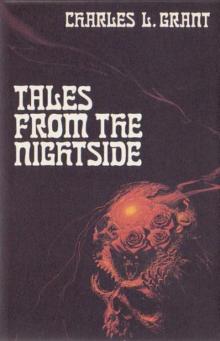 Tales from the Nightside
Tales from the Nightside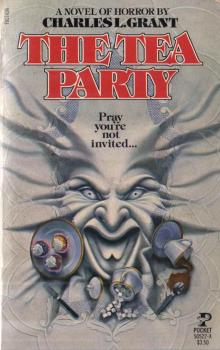 The Tea Party - A Novel of Horror
The Tea Party - A Novel of Horror The Complete Short Fiction of Charles L. Grant Volume 2: The Orchard (Necon Classic Horror)
The Complete Short Fiction of Charles L. Grant Volume 2: The Orchard (Necon Classic Horror) Whirlwind
Whirlwind Jackals
Jackals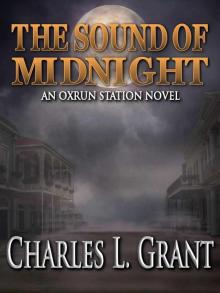 The Sound of Midnight - An Oxrun Station Novel
The Sound of Midnight - An Oxrun Station Novel